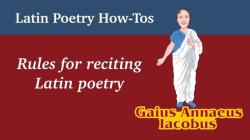Is Latin more logical than English?
Both Latin and English have distinct linguistic features, and comparing their logical aspects isn't straightforward. However, some aspects might make Latin seem more structured or logical in certain respects:
Grammar and Syntax:
- Latin's Grammatical Structure: Latin has a highly inflected grammar, where word endings change to indicate grammatical relationships (e.g., case endings for nouns, verbs conjugated based on person, number, tense). This often provides precision in indicating relationships between words in a sentence.
- English Word Order: English relies more on word order to convey meaning. While it has some inflections (like verb tense changes), word order plays a more significant role in establishing relationships between words in a sentence.
Precision and Clarity:
- Latin's Precision: Due to its inflected nature, Latin can be more precise in conveying relationships between words without relying solely on word order. This can contribute to logical clarity in expressing complex ideas.
- English Adaptability: English, with its flexibility in word order and extensive vocabulary, can adapt and absorb words from various languages, allowing for nuanced expressions of ideas.
Vocabulary and Concepts:
- Latin's Influence on English: Many technical, scientific, and legal terms in English are derived from Latin, contributing to precision and specific meanings in these fields.
- English's Richness: English is known for its extensive vocabulary and often has multiple words with subtle differences in meaning, offering varied ways to express ideas.
Context and Evolution:
- Latin as a Classical Language: Latin's logical appearance might stem from its usage in literature, science, and law in ancient times, contributing to its perception as a language of logic and precision.
- Evolution of English: English has evolved significantly, incorporating influences from various languages and cultures, which might make its structure seem less rigid compared to Latin.
Ultimately, both languages have their own logical systems and complexities. The perception of one being more logical than the other might stem from their structural differences and historical contexts. The perceived logic in language often varies based on familiarity, context, and specific uses within different fields.
1. Exploring the Structure of Latin: Unraveling the Logical Patterns and Rules of Latin Grammar
Latin, the ancient language of Rome, boasts a rich and intricate grammatical structure, governed by a set of logical patterns and rules. Delving into Latin grammar is akin to embarking on a journey of linguistic discovery, revealing the underlying principles that shape the language's form and function.
Key aspects of Latin grammar include:
Cases: Latin nouns are classified into eight cases, each denoting a specific grammatical function, such as subject, object, or possession. Understanding case usage is essential for constructing grammatically correct sentences.
Moods: Latin verbs exhibit three moods – indicative, imperative, and subjunctive – each conveying a distinct attitude or purpose. Mastering verb moods allows for precise communication of various intentions and actions.
Tenses: Latin verbs conjugate into six tenses, indicating the time frame of the action or state of being. Proper tense usage enables accurate expression of temporal relationships within sentences.
Sentence Structure: Latin sentences follow a strict word order, typically adhering to a subject-verb-object pattern. This structure provides clarity and organization to the language.
2. Comparing Latin and English Grammar: Unveiling Similarities and Contrasts
Comparing Latin and English grammar reveals fascinating parallels and intriguing distinctions, highlighting the evolution of languages and the enduring influence of Latin on English.
Similarities:
Word Formation: Both Latin and English employ Latin roots to form new words, demonstrating the linguistic heritage of English. For instance, "nation" and "national" both stem from the Latin "natio," meaning "birth" or "origin."
Grammatical Concepts: English retains certain grammatical concepts from Latin, such as verb tenses and noun declensions, albeit in simplified forms. For example, the concept of past, present, and future tenses is evident in both languages.
Differences:
Cases: Latin's eight cases have largely disappeared in English, though remnants remain in pronouns ("me," "him," "her") and possessive constructions ("the cat's tail").
Verb Conjugations: English verb conjugations are less complex than Latin's, with fewer variations based on person, number, and mood.
Sentence Structure: English sentence structure offers more flexibility, allowing for variations in word order, while Latin adheres to a more rigid subject-verb-object pattern.
3. Delving into the Evolution of Language: Unraveling the Dynamic Nature of Language Change
Language is not static; it is a dynamic and ever-evolving entity, shaped by historical, cultural, and social factors. Understanding the evolution of language provides insights into the forces that drive linguistic change and the interconnectedness of languages over time.
Key aspects of language evolution include:
Sound Changes: Languages undergo sound changes over time, leading to shifts in pronunciation and spelling. For instance, the Latin "pater" became the English "father" due to vowel shifts and consonant changes.
Borrowing: Languages borrow words from other languages, reflecting cultural interactions and linguistic influences. English has borrowed extensively from Latin, with words like "vocabulary," "education," and "structure" having Latin roots.
Grammar Simplification: Over time, grammatical structures may simplify, as seen in the loss of Latin's complex case system in English.
Semantic Shifts: The meaning of words can change over time, reflecting evolving cultural norms and societal shifts. For example, the Latin "virtus" originally meant "manly virtue," but it has evolved to mean "virtue" in English.
Exploring the evolution of language reveals the dynamic nature of human communication and the interconnectedness of languages across time and cultures.



